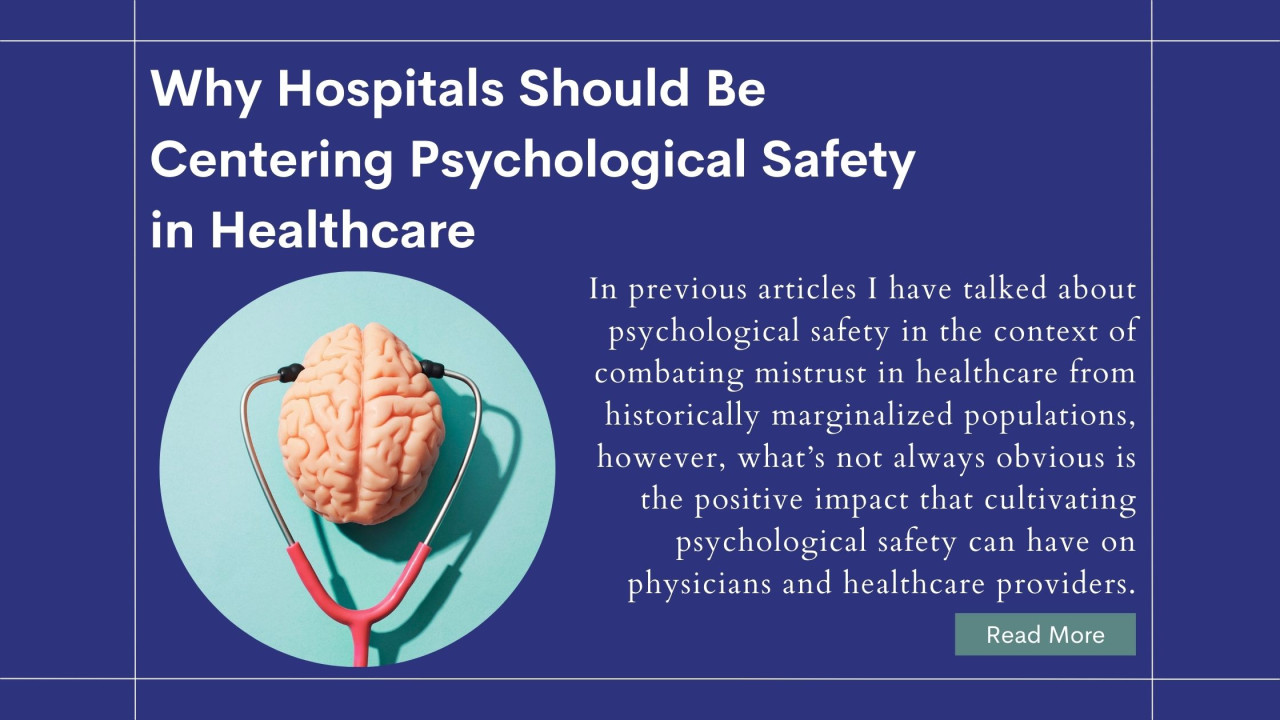(404) 793-0011 | drmaiysha@drmaiysha.com
Why Hospitals Should Be Centering Psychological Safety in Healthcare
In previous articles I have talked about psychological safety in the context of combating mistrust in healthcare from historically marginalized populations, however, what's not always obvious is the positive impact that cultivating psychological safety can have on physicians and healthcare providers.
Physician well-being is a critical (but not always recognized) component of healthcare delivery. When doctors are physically and mentally healthy, they can provide better care to their patients, and they stay longer in their careers. One often overlooked but essential factor in promoting physician well-being is psychological safety.
Psychological safety refers to an environment where individuals feel safe to voice their thoughts, concerns, and even mistakes without the fear of retribution or humiliation. In such a setting, people can express themselves authentically, fostering trust and open communication. While only part of the safety triangle (physical safety and identity safety being two others), psychological safety can contribute to the longevity of a healthcare provider's career and matriculation in one's organization.
When I was in residency, I suffered from depression, but I hid it because I didn't feel safe to share for fear it would make me look like I couldn't "hack it". However, in retrospect, feeling safe could have saved me from being on the edge of life like so many of my colleagues.
The Relevance of Psychological Safety in Healthcare:
Fostering Inclusion and Equity: It is crucial to emphasize the significance of psychological safety, especially for historically marginalized doctors who often face unique challenges related to bias and discrimination. A psychologically safe environment ensures these physicians can address their concerns and challenges without gaslighting and fear of retribution. When there is psychological safety in the training and practice environment, doctors can bring their whole self to work and show up fully for their patients.
Empowering Authentic Voices: Physicians have the potential to bring diverse perspectives to areas that are beyond the exam room. When their ideas are welcomed rather than dismissed or invalidated, doctors can and will contribute meaningfully and innovatively to important discussions within healthcare organizations.
Preventing Harmful Silence: Discrimination, harassment, and microaggressions can take a severe toll on the mental well-being especially in historically marginalized doctors, nurses, and staff. Because one of the aspects of a psychologically safe environment is making it safe to challenge (or provide feedback), it brings accountability to unacceptable behavior by encouraging doctors and other healthcare providers to report such incidents, preventing harmful silence that leads to burnout, mental health decline, and ultimately fostering a more respectful workplace.
Overall, psychological safety in healthcare promotes an inclusive, equitable culture of true belonging. When physicians, healthcare providers, and staff feel safe to learn, express, be human, provide feedback, and challenge errors and unacceptable behavior (without fear of retaliation), they can contribute in a more meaningful way and often desire to make an environment like this their permanent career home.
Psychological safety is not just a buzzword; it is a strategic imperative for healthcare organizations. A vital concept in healthcare, it not only protects the mental well-being of physicians, healthcare providers, and staff (especially in historically marginalized communities), but also contributes significantly to their job fulfillment, retention, and leadership within the organization. By creating an environment where physicians can be their authentic selves, voice their concerns, challenge biases, and thrive, organizations not only cultivate a more diverse and inclusive healthcare workforce but also provide better and more equitable and cost-effective care for their patients.
Need a speaker? Learn more about Dr. Maiysha's speaking and trainings. Bring the tools of trauma responsive communication into your organization and create psychological safety in your organization. Increase employee engagement, fulfillment, and retention. Contact us today and schedule a call with Dr. Maiysha to learn how we can improve your workplace culture. https://mindremappingacademy.com/corporate-programs
Stay Informed
When you subscribe to the blog, we will send you an e-mail when there are new updates on the site so you wouldn't miss them.





Comments